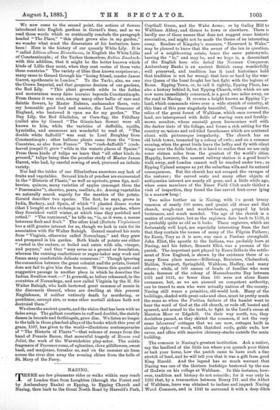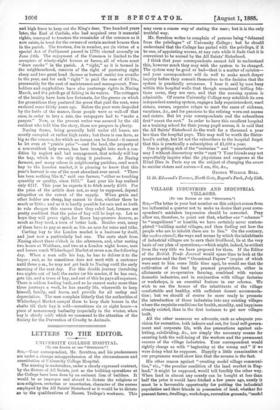NAZING.
THERE are few pleasanter rides or walks within easy reach of London than from Loughton (through the Forest and by Ambersbnry Banks) or Epping, to Epping Church and Nazing, then back to the Great North Road by Harrold's Park, Copthall Green, and the Wake Arms ; or by Galley Hill to Waltham Abbey, and thence to town or elsewhere. There is hardly one of these names that does not suggest some historic association, and might not be made the theme of an interesting essay. Readers of Kingsley's romance, "Hereward le Wake," may be pleased to know that the owner of the inn in question, and of a neighbouring estate, bears the same patronymic, barring the "le," and may be, and we hope is, a descendant of the English hero who defied the Norman Conqueror. Ambersbnry Banks is an ancient British camp wonderfully well preserved, and tradition has it (and historians hold that tradition is not far wrong) that here or hard by the war- rior Queen of the Iceni fought her last fight with the legions of Rome. Epping Town, or, to call it rightly, Epping Place, has also a history behind it, but Epping Church, with which we are now more immediately concerned, is a good two miles away, on the road to Nazing. It crowns a height known as Epping Up- land, which commands views over a wide stretch of country, at this time of this year singularly beautiful. Clumps of timber, relics of the great forest of Waltham, which once covered the land, are interspersed with fields of waving corn and freshly- mown meadow, whose emerald green harmonises well with the darker tints of the foliage, and forms a rich setting for the country munsions and red-tiled farmhouses which are scattered about with picturesque irregularity. The church has an old brick tower, tenanted by a colony of owls; and on a summer evening, when the great birds leave the belfry and fly with silent wings over the fields below, it is hard to realise that we are only some sixteen miles from the greatest of the world's cities. Happily, however, the nearest railway station is a good hour's walk away, and London cannot well be reached under two ; so Epping Upland escapes as yet the suburban villa and its natural consequences. But the church has not escaped the ravages of the restorer ; the carved seats and many other objects of antiquarian interest are nearly all gone, and a little while ago, when some members of the Essex Field Club made thither a visit of inspection, they found the fine carved font-cover lying in a manure heap !
Two miles further on is Nazing, with i's great breezy common of nearly 500 acres, and quaint old stone and flint church, rough-cast and weather-beaten, propped by brick buttresses, and much mended. The age of the church is a matter of conjecture, but as the registers date back to 1559, it is probably quite as old as it looks. These registers, which are fortunately well kept, are especially interesting from the fact that they contain the names of many of the Pilgrim Fathers; for Essex, Tory as it is now, was once a Puritan stronghold. John Eliot, the apostle to the Indians, was probably born at Nazing, and his father, Bennett Eliot, was a yeoman of the parish. The important part played by Essex:folks in the settle- ment of New England, is shown by the existence there of so many Essex place names—Billericay, Braintree, Chelmsford, !Weldon, Newport, Springfield, Waltham, Hadley, and many others ; while, of 500 names of heads of families who were made freemen of the colony of Massachusetts Bay between 1631 and 1641, no fewer than 185 were not alone Essex surnames, but, as we are assured on competent authority, can be traced to men who were actually natives of the county. Nazing still wears a primitive, old-world look. Many of the buildings, shaded with great oaks and elms, must be pretty much the same as when the Puritan fathers of the hamlet went to hear the word of God at the old church, or rode off, booted and spurred, and armed to the teeth, to fight in the Lord's cause at Marston Moor or Edgehill. On their way north, too, they doubtless passed, as they skirted the common, if not the very same labourers' cottages that we see now, cottages built in similar style,—of wood, with thatched roofs, gable ends, low eaves, and often with massive chimney-stacks outside the main building.
The common is Nazing's greatest institution. Ask a native, say the landlord of the little inn where you quench your thirst or bait your horse, how the parish came to have such a fine stretch of land, and he will tell you that it was a gift from good King Harold. And the legend has so much warrant that Nazing was one of the thirteen lordships bestowed by the son of Godwin on his college at Waltham. In this instance, how- ever, tradition and history do not coincide; for it was only in 1226 that, by a transaction between Henry III. and the Abbot of Waltham, leave was obtained to inclose and impark Nazing Wood Common, and in 1341 to surround it with a deep ditch and high fence to keep out the King's deer. Two hundred years later, the Earl of Carlisle, who had acquired over it manorial rights, conveyed to trustees the remainder of the common as it now exists, in trust for the owners of certain ancient houses then in the parish. The trustees, five in number, are (in virtue of a special Act of Parliament passed in 1778) elected annually on June 24th. The enjoyment of the Common is limited to the occupiers of ninety-eight houses or farms, all of whom must "draw smoke" in the parish. A "right," as it is termed in the neighbourhood, consists of the right of pasturing eight sheep and two great head (horses or horned cattle) ten months in the year, and for each " right " is paid the sum of 23 10s., presumably for the cost of maintenance and management. Free- holders and copyholders have also pasturage rights in Nazing Marsh, and the privilege of fishing in its waters. The cottagers of the locality have been less fortunate, for the greens on which for generations they pastured the geese that paid the rent, were enclosed some thirty years ago. Before the poor were despoiled by the lords of the manor, these people were so well-off that once, in order to levy a rate, the ratepayers had to "make a pauper." Now, as the present writer was assured by the old resident who told, him the story, there are paupers in plenty.
Nazing farms, being generally held under old leases, are mostly occupied at rather high rests; but there is one farm, as big as the common, for which no tenant can be found—it cannot be let even at "prairie price "—and the land, the property of a non-resident lady owner, has been brought into such a con- dition by neglect and bad management, that nobody will buy the hay, which is the only thing it produces. As Nazing farmers, and many others in neighbouring parishes, send much hay to the London market, it is pleasing to know that this year's harvest is one of the most abundant ever saved. "There has been nothing like it," said one farmer, "either as touching quantity or quality, since 18M." Last year his hay realised only £117. This year he expects it to fetch nearly 2500. For the price of the article does not, as may be supposed, depend altogether on the extent of the supply. When grain and other fodder are cheap, hay cannot be dear, whether there be much or little ; and as it is hardly possible for oats and so forth to rule cheaper this season than they ruled last, farmers are pretty confident that the price of hay will be kept up. Let us hope they will prove right, for Essex hay-growers deserve, as much as they need, a turn of better lack. Besides rent, many of them have to pay as much as 10s. an acre for rates and tithe.
Carting hay to the Loudon market is a business by itself, and just now a particularly bad one. The carts start from Nazing about three o'clock in the afternoon, and, after resting two hours at Waltham, and two at a London night house, men and horses reach Whitecl3apel Market at seven a.m. the following day. When a man sells his hay, he has to deliver it to the buyer; and, as he sometimes does not meet with a customer until three p.m., he may not get back to Nazing until the early morning of the next day. For this double journey (involving two nights out of bed) the carter (or his master, if he has one), gets 12s. and a truss of hay, and out of this he pays all expenses.
There is seldom loading back, and as he cannot make more than three journeys a week, he has exactly 36s. wherewith to keep himself, family, and horse, and provide for all outlay and
depreciation. The men complain bitterly that the authorities of Whitechapel Market compel them to keep their horses in the shafts till their hay is sold—sometimes six or eight hours—a piece of unnecessary barbarity (especially in the winter, when hay is chiefly sold) which we commend to the attention of the Society for the Prevention of Cruelty to Animals.



































 Previous page
Previous page